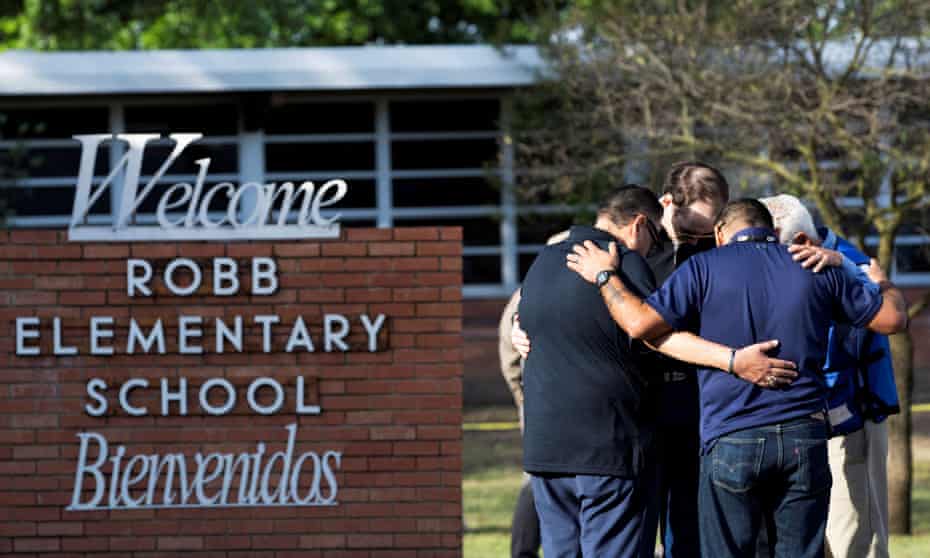Some days it feels like guns are such a foundational part of American identity that the country would have to cease to be itself before it would give them up. When a gunman murdered dozens of elementary-age schoolchildren, leaving their bodies in such a state that parents had to give up DNA samples for them to be identified, it was one such day. What cultural value, what material interest, could be worth this? It must be something that its defenders consider supremely important.
Guns – that’s what. Critics of the sickness which is America’s obsession with guns often focus their fire on the second amendment, or the perverse political influence of the National Rifle Association. But neither of these things really get to the root of the pathology. It’s true that gun-rights advocates rely on a surely mistaken reading of the constitution to justify arming themselves to the teeth. And it’s also true that the NRA is a malign force in American politics. But the constitution can be changed or reinterpreted, and special interest groups can be vanquished. What is at issue here is something more foundational, and more difficult to change: American culture itself.
The gun is the great symbol, and poisonous offshoot, of American individualism. The country has long valorized masculine heroes – the cowboy, the frontiersman, the patriotic soldier – who impose their will on the community’s enemies with violence. It’s no coincidence that whenever a horrific mass shooting occurs, those in favor of guns respond by claiming that the solution to the guns of the bad guys is more guns in the hands of the good guys. Such reasoning responds to a deep-seated American historical myth, and allows the speaker to imagine themselves as the hero.
But they are not heroes – far from it. Mass shooters may be, as the writer John Ganz put it, the “nightmare obverse” of the ideal of the lone frontiersman. But everyone else who defends their own right to possess a gun, who lauds guns as the bringers of peace and order, is guilty too. Their choices make society less safe, not more. The pleasure derived from guns, the sense of participation in America’s deepest myths about itself which they might foster, come at the expense of tens of thousands of lives a year. Sometimes, they are the lives of small children, innocent to the ways of a world which has allowed them to die.
Men own guns at nearly twice the rate of women, and within all of this there is something deeply pathetic about the state of American manhood. American gun culture treats ownership of weapons of war as a sign of masculinity and virility, something that makes you more of a man. Almost anywhere else in the western world, a man seeking to demonstrate his masculinity in this way would be treated as an absurd and tragic poser. No doubt many gun owners tell themselves that they are better equipped to protect the innocent. But they are wrong. Rather, gun culture reveals the centrality of violence to American conceptions of manhood – a violence which ultimately harms rather than protects.
If the problem is cultural, then what is the solution? There is no easy one. By now, the grooves of the debate are well-worn, and even a shocking event like the Uvalde massacre will not shake us out of it for long. Proposals to change the law or the constitution will be bitterly criticized, and gun-rights proponents will present the shooter as an anomaly who holds no lessons for “responsible” gun-owners. The supreme court is expected soon to loosen rather than tighten the law around carrying guns in public. Republicans will angrily decry attempts to “politicize” the massacre, as if the fact that innocent children are being brutally murdered due to the policies those very same Republicans support was not already a political issue of the highest order.
But cultural change is not impossible. It has happened in recent decades on very important issues. America also contains within itself the will to self-improvement, and citizens who will give their all to achieve it. Sometimes it comes before political or legal change, and sometimes it comes after it. The only way to avoid despair is to see the struggle to protect innocent lives against the ravages of gun violence as a multi-generational struggle akin to that which won African Americans the right to vote, or that which won the right to gay marriage. Each of these required Americans in the grip of myths and pathologies to relinquish them, and each at one time seemed impossible. But change did eventually come.
The path ahead will not be easy – and, as the supreme court’s expected ruling on Roe v Wade has shown, there will be setbacks along the way. Those who embody a pathological understanding of what America should be are currently ascendant, and there will be no easy victory over them. But despair would be surrender. That’s why for now there is the need to mourn the tiny lives which were extinguished. Remember them, and in doing so remember something else: America’s genius is that it can be changed, never quickly enough, but always in the end. It’s a slim hope to grasp onto in this moment of rage and sorrow, but it may be all that we have left.


Leave A Comment